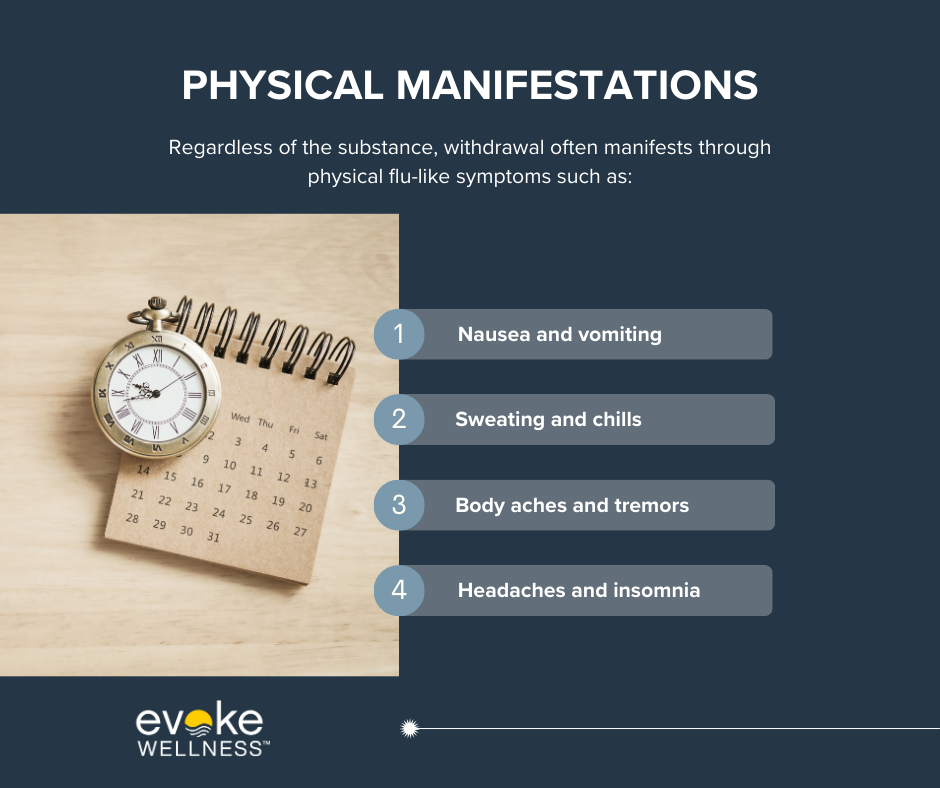When you’re considering addiction treatment, understanding the detox process is crucial. You may wonder, “How long does detox take?” The answer isn’t one-size-fits-all. Recent studies show that detox duration can vary widely, from a few days to several weeks, depending on multiple factors. A 2022 review in the Journal of Substance Abuse Treatment found that the average inpatient detox lasts 5-7 days, but individual experiences differ significantly. This article will guide you through the timeline of detox and explore the key elements that influence its length. By understanding these factors, you’ll be better prepared to navigate this critical first step in your recovery journey.
Together, let’s embrace the journey to recovery and the promise of a new beginning. Call us at (833) 819-6066 today or reach out online.
What Is Detoxification?
The First Step in Recovery
Detoxification, or detox, is the crucial first step in the recovery process for individuals battling substance abuse and addiction. It involves safely removing toxins and substances from the body under medical supervision. During this phase, the body rids itself of drugs, alcohol, or other harmful substances that have accumulated due to prolonged substance misuse.
Managing Withdrawal Symptoms
As the substances leave the system, individuals often experience a range of physical and psychological withdrawal symptoms. These can include nausea, vomiting, anxiety, depression, insomnia, muscle aches, and intense cravings. Medically supervised detox provides a controlled, monitored environment to effectively manage these potentially dangerous withdrawal effects.
Comprehensive Care
At Evoke Wellness Miramar, the detox process is tailored to each client’s unique needs and the specific substance(s) they are dependent on. Their specialized detox programs address addictions to alcohol, opioids (including prescription painkillers like Percocet), cocaine, benzodiazepines, and more. Clients receive 24/7 medical care, counseling, and a tranquil setting to support their journey through this critical first phase.
How Long Does Detox Take?
Alcohol Detox Timeline
The duration of alcohol detox can vary considerably based on several factors. However, most cases follow a typical timeline:
- Early withdrawal (6-48 hours): Mild symptoms like anxiety, nausea, insomnia
- Peak withdrawal (1-3 days): Severe side effects like tremors, vomiting, potential seizures
- Protracted phase (4 days – months): Lingering psychological issues like cravings, mood swings
Factors Influencing Detox Length
The overall detox process length hinges on the individual’s unique circumstances:
- Addiction severity and duration of alcohol abuse
- Overall health status and any co-occurring disorders
- Use of other addictive substances alongside alcohol
Importance of Medical Supervision
Attempting to quit alcohol cold turkey can be extremely dangerous, even life-threatening without proper medical care. Professional detox programs provide:
- 24/7 monitoring and support to manage withdrawal safely
- Medications to ease symptoms like tremors and anxiety
- Controlled environments to prevent risky complications
Post-Acute Withdrawal Syndrome
Even after initial detox, some experience Post-Acute Withdrawal Syndrome (PAWS). Lingering effects may include:
- Psychological issues like depression, anxiety, insomnia
- Physical symptoms like muscle aches, night sweats
- Strong, persistent cravings that increase relapse risks
PAWS duration is highly variable, potentially lasting months for certain substances. Comprehensive, long-term treatment is crucial for full recovery.
Factors That Impact the Detox Timeline
Individual Factors
- Dosage and frequency of substance use: Higher doses and more frequent use often leads to a longer, more intense detox period. Chronic severe alcoholics who consume excessive amounts over many years face a particularly challenging withdrawal.
- Duration of addiction: Long-term, heavy use causes increased physiological dependence, requiring a more gradual taper and lengthier detox timeline compared to briefer addictions.
- Method of consumption: Different routes like injection versus ingestion can impact how rapidly a substance is absorbed and metabolized, influencing withdrawal onset and duration.
Substance-Specific Factors
- Half-life and metabolism: Drugs with longer half-lives like diazepam (Valium) remain in the body longer, requiring more time to fully eliminate and stabilize brain chemistry.
- Presence of active metabolites: Certain substances produce metabolites that linger, potentially extending the acute detox phase as the body works to clear these byproducts.
- Withdrawal symptom severity: Highly addictive substances like opioids often trigger intense physical and psychological withdrawal effects requiring a slower, more gradual taper.
Co-Occurring Conditions
- Mental health disorders: Underlying issues like depression or anxiety can worsen during the detox process and may require integrated treatment approaches.
- Medical complications: Those with chronic conditions like heart or liver disease may face greater risks during detox and require specialized medical monitoring.
- Polysubstance abuse: Detoxing from multiple substances simultaneously adds layers of complexity that can prolong the withdrawal timeline.
Ultimately, professional addiction treatment programs tailor detox protocols to each client’s unique circumstances and medical needs for the safest, most comfortable experience possible. With comprehensive care, the challenges of detox can be successfully managed.
The Length of Detox By Substance
Detox duration can vary significantly depending on the substance involved. Certain drugs tend to produce more severe withdrawal symptoms that linger for extended periods.
Opioids and Heroin
Detoxing from opioids like heroin often results in a prolonged battle with Post-Acute Withdrawal Syndrome (PAWS). PAWS symptoms like anxiety, depression, insomnia and cognitive impairment can persist for up to 6 months after quitting. The severity and duration of the addiction play a role, with heavier, longer-term users experiencing more intense PAWS.
Benzodiazepines
Chronic anxiety, depression and sleep issues frequently haunt those detoxing from benzos like Xanax. These unsettling psychological effects may linger for several months due to the brain’s dependence on these sedative drugs.
Ketamine
For party drugs like ketamine, psychological issues like psychosis could drag on for up to 6 months during detox. Comprehensive treatment is crucial for managing these prolonged PAWS symptoms.
Seeking professional help at a qualified detox and addiction treatment center is vital, no matter the substance. The compassionate team at Evoke Wellness provides medical detox, therapy, and relapse prevention planning to guide each individual safely through recovery.
Detox Withdrawal Effects are Common to All Substances
While detoxing from different substances comes with its own set of unique challenges, all withdrawals share certain commonalities. The brain’s complex neurochemistry becomes disrupted during substance abuse, adapting to the presence of drugs. When that supply is cut off, intense physical and psychological symptoms emerge as the brain struggles to regain equilibrium.

These effects can range from highly uncomfortable to potentially life-threatening, highlighting the importance of medically supervised detox.
Psychological Turmoil
On the psychological front, individuals can experience:
- Intense drug cravings
- Anxiety and irritability
- Depression and mood swings
- Confusion and difficulty concentrating
This internal upheaval makes relapse an ever-present risk, underscoring the value of comprehensive treatment that addresses root causes.
Post-Acute Withdrawal Syndrome (PAWS)
Even after acute withdrawal, many face post-acute withdrawal syndrome with lingering symptoms like:
- Sleep disturbances
- Emotional instability
- Lack of motivation
- Impaired cognition
PAWS can persist for weeks or months, requiring ongoing care and relapse prevention strategies for successful long-term recovery.
While detox timelines and specific effects vary across substances, all withdrawals share overarching physical, psychological, and persistent effects. Seeking professional treatment is crucial for managing these symptoms safely and increasing the chances of lasting sobriety.
Treatment Support for Detox and Recovery
Comprehensive Care
When overcoming addiction, the path to recovery requires a holistic approach. Detox alone is not enough – ongoing treatment and support are crucial for lasting sobriety. At Evoke Wellness, we offer comprehensive care tailored to each individual’s needs.
Our programs combine evidence-based therapies, medication-assisted treatment, and a focus on mental, physical, and spiritual wellness. This multi-pronged approach addresses the root causes of addiction and equips clients with the tools for a successful, sustainable recovery.
Personalized Support
Recovery is a highly personal journey, and our treatment plans reflect that. Our team of experienced professionals works closely with each client to develop a customized strategy that considers their unique circumstances, challenges, and goals.
Whether you’re struggling with alcohol, opioids, stimulants, or other substances, we provide specialized care tailored to your specific needs. We also offer dual diagnosis treatment for those with co-occurring mental health disorders, ensuring all underlying issues are addressed simultaneously.
Continuum of Care
At Evoke Wellness, we understand that recovery is an ongoing process that extends beyond the initial detox and treatment phases. That’s why we offer a comprehensive continuum of care, including:
- Medically supervised detox to safely manage withdrawal symptoms
- Residential inpatient treatment for immersive, focused care
- Intensive outpatient and partial hospitalization programs
- Sober living communities for structured, supportive transitional housing
- Ongoing aftercare and alumni services to prevent relapse
With our continuum of care, clients can seamlessly transition between levels of treatment as their needs evolve, ensuring they receive the right support at every stage of their recovery journey.
Detox FAQs
What are the dangers of detoxing alone?
Attempting to quit alcohol or drugs “cold turkey” without medical supervision can be extremely dangerous and even life-threatening due to severe withdrawal symptoms. Withdrawal effects like seizures, delirium tremens, and intense cravings put individuals at high risk of relapse and serious complications.
Why is medical detox important?
In a professional detox setting, clients receive 24/7 medical monitoring and care. Medications are provided to safely manage withdrawal, control symptoms, prevent complications, and ease discomfort. Comprehensive detox programs also offer therapeutic support to address the root causes of addiction.
What is Post-Acute Withdrawal Syndrome (PAWS)?
Post-Acute Withdrawal Syndrome refers to prolonged withdrawal effects like anxiety, depression, insomnia, and cognitive issues that can persist for months after quitting. PAWS severity depends on factors like the substance, addiction length, and mental health history. Professional treatment is crucial for managing these symptoms.
How long does detox take?
The detox timeline varies, but typically ranges from 5-7 days for alcohol and most drugs. However, some effects like insomnia and mood swings can continue for weeks or months due to PAWS. A comprehensive addiction treatment plan is necessary beyond just the initial detox phase.
Conclusion
In conclusion, the duration of detox varies significantly based on numerous factors. While the average timeline spans 3-10 days, your individual experience may differ. Recent studies indicate that up to 50% of individuals require extended detox periods of 2 weeks or more.
These elements all play crucial roles in determining your detox timeline. By understanding these factors and working closely with medical professionals, you can approach detox with realistic expectations and maximize your chances of a successful recovery. Ultimately, detox is a vital first step on your journey to long-term sobriety and improved well-being.
Begin Your Journey with Evoke Wellness at Miramar
If you or a loved one is considering treatment, Evoke Wellness at Miramar invites you to contact us. Our compassionate team is ready to answer your questions, discuss your needs, and help you take the first steps toward recovery. In Miramar, you’ll find more than just a treatment program – you’ll discover a community dedicated to your wellness and success. Together, let’s embrace the journey to recovery and the promise of a new beginning. Call us at (833) 819-6066 today or reach out online.


